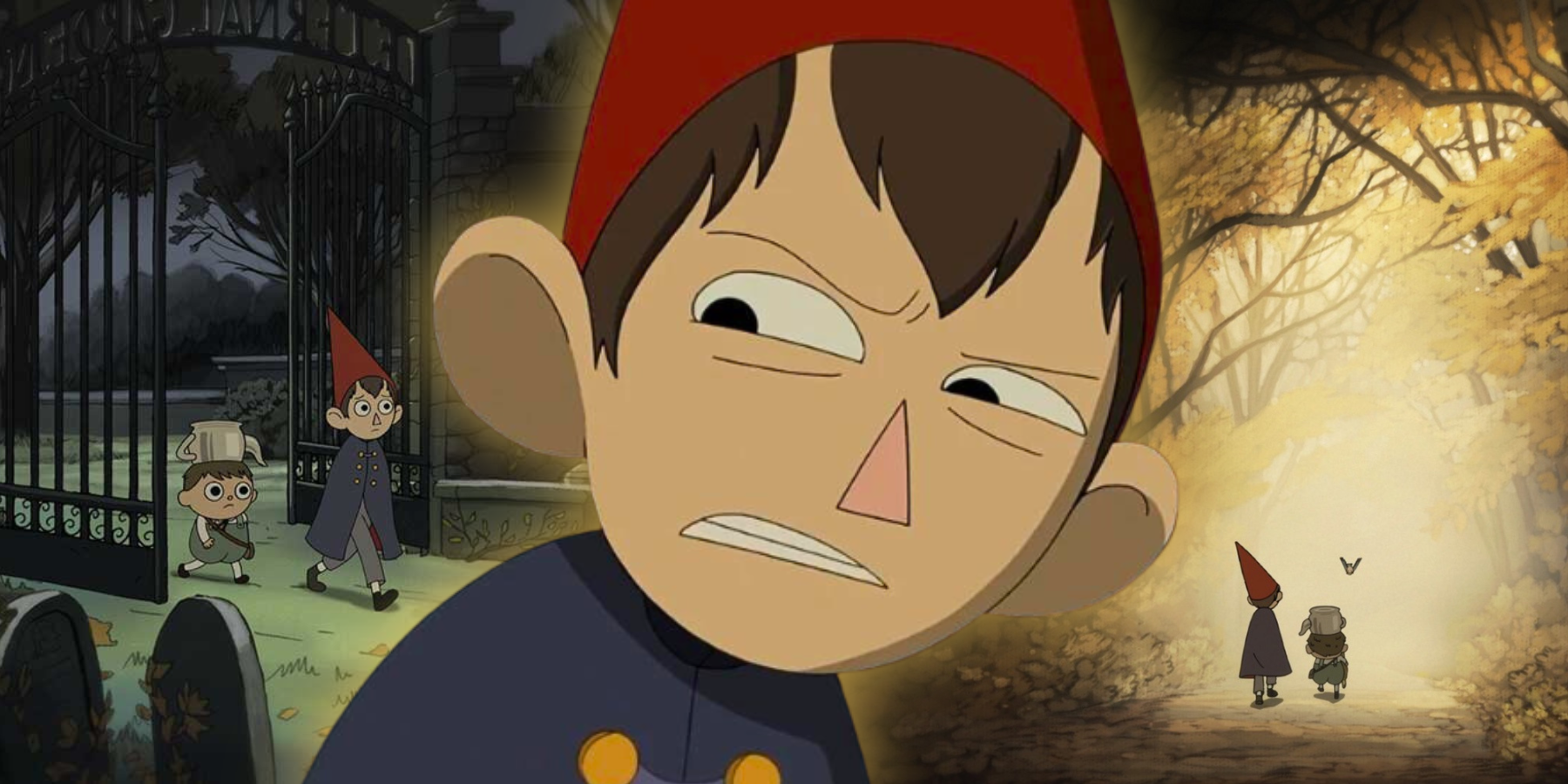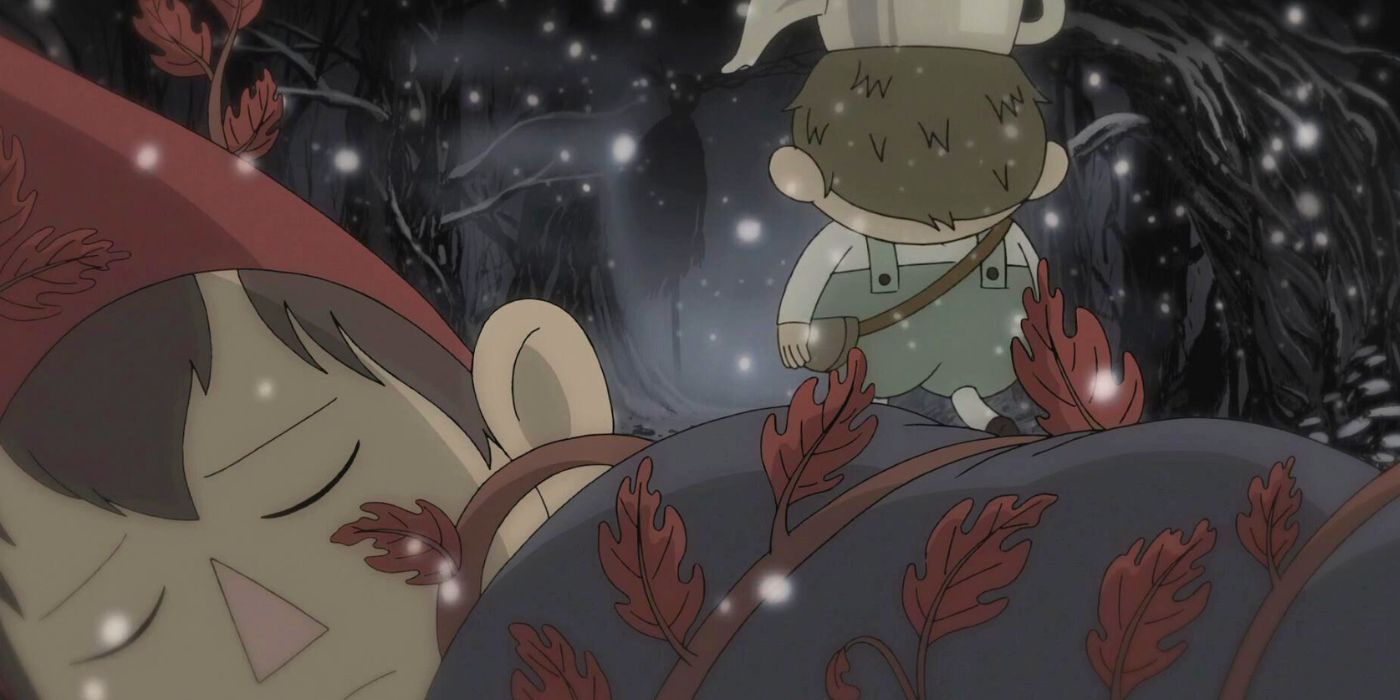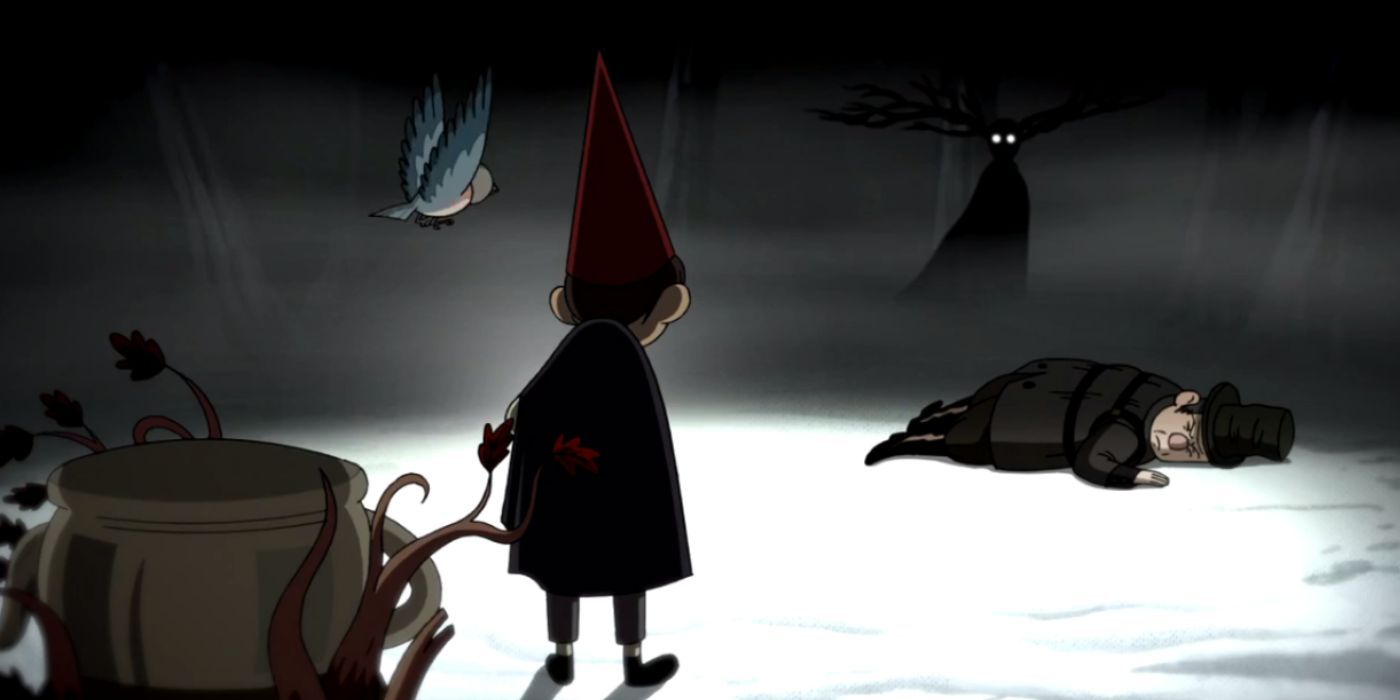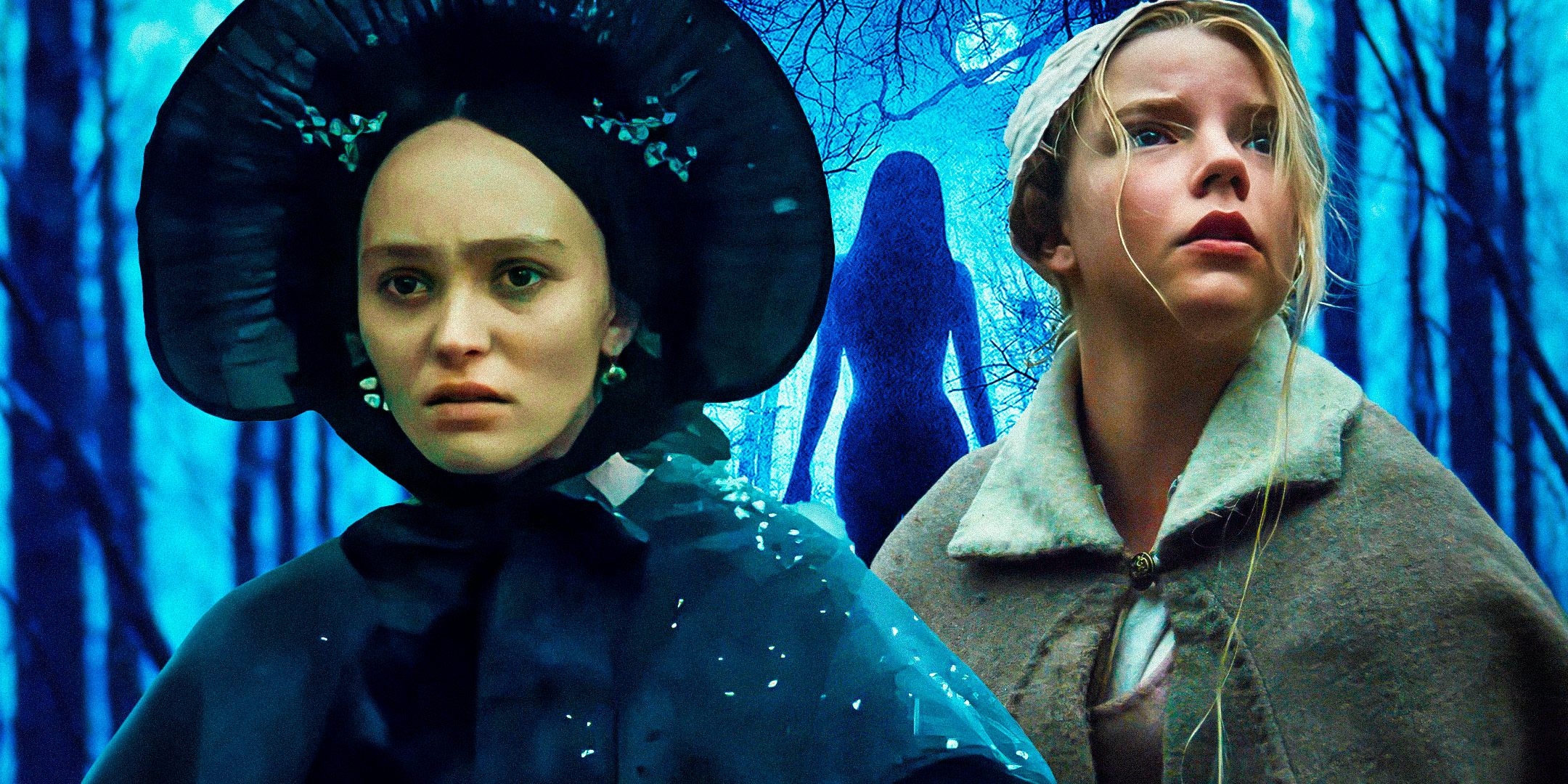Over The Garden Wall’s Story & True Meaning Explained – Was It All A Hallucination?

Since its release in 2014, a lot has been debated about Over the Garden Wall‘s intricate story as well as the true meaning of the miniseries’ somewhat ambiguous ending. The 10-episode cult hit centers on half-brothers Wirt (Elijah Wood) and Greg (Collin Dean) as they traverse the Unknown — the strange woods they find themselves wandering around in. An autumn must-watch, Over the Garden Wall‘s first episode, “The Old Grist Mill,” doesn’t offer a lot of context for how and why the brothers are in the woods, choosing instead to play into the fairy-tale feeling of what can be considered one of the best animated shows of all time.
However, that initial chapter does set up a host of other fantastical, strange characters who come into play in the series finale, including the talking bluebird Beatrice (Melanie Lynskey), who becomes the brothers’ companion, and an old Woodsman (Christopher Lloyd), who warns the boys of the Beast (Samuel Ramey) that lurks in the woods. A blend of whimsy, humor, and poignancy, the miniseries tells a story that’s much more elaborate than its fable-like first episode implies. With a few astounding twists and some deeply compelling metaphors to its name, Over the Garden Wall‘s profound ending allows it to endure.
Was Over The Garden Wall A Hallucination Or Not?
The Glowing Bell Suggests The Events Of The Show Were Real
In its penultimate episode, Over the Garden Wall reveals its big twist: Wirt and Greg are modern-day kids who happened into the Unknown on Halloween night. Throughout the miniseries, Wirt references Sara, a girl he has a crush on. It’s eventually revealed that he made her an embarrassing mixed tape on Halloween and followed her to the local cemetery to take it back. However, when the kids’ graveyard ghost story party is interrupted by some cops, Wirt and Greg hop over a garden wall and tumble into the path of an oncoming train. To save them both, Wirt pulls his brother into a body of water on the edge of the tracks.
In the Unknown, the Over the Garden Wall finale sees Wirt saving his younger brother from the Beast’s clutches, but, back in their hometown, the siblings wake up in the hospital. And that’s when the show delivers a final twist. In the recovery room, Greg’s frog companion glows, implying the magical item he swallowed while in the Unknown actually exists. Some viewers contend that the bulk of Over the Garden Wall‘s story is a hallucination — something the brothers collectively experienced while drowning. However, the glowing bell inside of Greg’s frog undermines the whole “it was just a dream” theory, which is part of what makes Over the Garden Wall one of the best Cartoon Network original shows.
While Over the Garden Wall‘s ending is open to interpretation, death pervades the show’s setting, themes, and plot lines. When the miniseries begins, it’s autumn — leaves change colors and plants wilt. By the end of the show, the first snowfall of winter blankets the Unknown. This change of the seasons echoes Wirt’s feelings about returning home: at first, he’s somewhat hopeful, but that fades over the course of the first eight episodes. As the woods die, Wirt resigns himself to never escaping the Unknown. The Beast, which embodies giving in, feeds on that exhaustion and despair.
The subplots of the episodes further this connection to death, as most chapters see the brothers helping other lost souls find peace or contentment by resolving their problems. One of the most obvious connections to death comes in Over the Garden Wall‘s episode 2, which centers on a bizarre harvest. In the episode, the skeletal denizens of Pottsfield dig up their fellow recently-deceased skeletons and don gourds as costumes. The town’s massive, pumpkin-headed leader, Enoch, tells Wirt, “Oh well, you’ll join us someday.” While it may or may not be the final resting place for souls, the Unknown serves as a crossroads — a limbo that’s between life and death.
The Real Point Of Over The Garden Wall
The Show Teaches Young Viewers To Face Their Inner Demons
With the Unknown being a purgatory-like place, the souls who enter its maze of woods can only leave once they accept death (or choose life). The Beast has a taste for lost souls and thrives on their despair. In the world of Over the Garden Wall, those who surrender to hopelessness turn into Edelwood trees — the fuel for the Woodsman’s lantern. Tasked with keeping the lantern lit, the Woodsman learns that the Beast trapped his daughter’s soul within the object. However, this all ends up being a lie: it’s actually the Beast’s life force that resides in the lantern, so the shadowy entity tricked the Woodsman into nurturing him.
In the lead-up to episode 10, Wirt gives in to the hopelessness, suggesting Greg lead them if he really wants to keep trying. Eager to help, Greg is manipulated by the Beast, who wants to turn the young child into an Edelwood tree. In the Over the Garden Wall finale, Wirt pleads with the Beast, offering to trade himself for Greg. As evidenced by the show’s late-season flashbacks, Wirt struggles with confidence.
Instead of facing his fears, he runs from them. In fact, Wirt thinks his peers are out to get him, when, in reality, he’s constantly sabotaging himself due to his insecurities. The Unknown’s horrors force Wirt to face the things that challenge him. Ultimately, this newfound strength helps him realize the Beast’s scheme. Part of the beauty of Over the Garden Wall is its distinct lack of absolute answers. Instead, the miniseries invites viewers to pull out their own meaning from the show’s narrative and themes.
Whether audiences agree that the Unknown is limbo, the afterlife, or something else entirely, it is clear that the fantastical realm encourages Wirt to change. Instead of giving in to the Beast — that thing that lurks inside us all and tells us to give into despair and stop fighting — Wirt chooses to look at what frightens him most at the end of Over the Garden Wall and pulls back the curtain. The brothers don’t just allow themselves to be taken by the current. Instead, they fight to return home — to the life that exists on the other side of the garden wall.
Other Theories On The True Meaning Of Over The Garden Wall
There Have Been Multiple Ways To Interpret The Show
There have been many theories about the true meaning behind Over The Garden Wall, and not all of them are as bleak as the idea that Wirt and Greg are in some kind of purgatory (though, admittedly, most theories do still play into this idea, since it’s incredibly plausible given the overall tone and aesthetic of the miniseries).
A common theme among many of the alternate Over The Garden Wall theories looks at the events that takes place far less literally. They instead put stock in the metaphorical message behind the show, and what it meant for Wirt and Greg’s life as they eventually grow and become adults. These theories suggest the meaning of the show is the importance and power of stories.
According to these theories, none of the events of Over The Garden Wall actually happened, but that doesn’t make them insignificant. The theories suggest that Over The Garden Wall is being told almost in retrospect, likely from the perspective of Greg. Everything that happened is based on stories Wirt told him about their adventures to make the reality far less traumatic. This is where the bell inside the frog comes into play, and why it’s such an important metaphor.
The theory suggests that the reality of Over The Garden Wall is far less important than the stories Greg remembers. The fact Wirt saved Gregs life (even though they almost drowned) is secondary in Greg’s memories to the “stories” of everything that happened on their fantastical adventure. It’s easy to imagine that Wirt, as a protective older brother, made up these stories to help Greg process the entire ordeal.
According to the many Over The Garden Wall theories that eschew the purgatory idea, this is what’s important, and is symbolized through the bell in the frog — it’s not the memories of the trauma Greg will carry into adulthood, but fantasy adventure (the story that Wirt presumably told him) he imagined in their stead.
How The Ending Is Part Of Over The Garden Wall’s Impact
The Minseries Ending On Such An Ambiguous Note Secured Its Legacy
Considering it only ran for 10 episodes, and that they aired a decade ago, Over The Garden Wall has had a phenomenal legacy and impact. The show is still being discussed in the 2020s, and it’s considered by many fans to be a neatly-contained story that doesn’t require any reboot or follow-up season. While the charming animation and overall narrative have contributed to this, it’s the ending of Over The Garden Wall which has truly ensured the miniseries went down as one of the best single-season shows in Cartoon Network history.
The ending of the show and the reveal that Wirt and Greg actually existed in the modern day created a lot of questions, but they weren’t the kind of queries that detracted from Over The Garden Wall overall. It gave the series a definitive end, and one that wrapped up all the themes and ideas underpinning the creepy-yet-whimsical fairytale neatly.
Had Over The Garden Wall ended on a less ambiguous note, it would have left the story open-ended, and this in turn would have created demand for new adventures featuring Wirt, Greg, and the intriguing world the show threw them into. However, by sticking to its plan of being a self-contained miniseries that told a single story with a defined beginning and end, as well as one that focused more on its themes and meaning than the events of the narrative, Over The Garden Wall became an infinitely rewatchable show that has stood the test of time.
World News || Latest News || U.S. News
Source link





